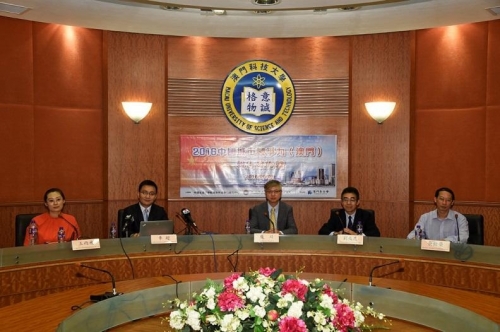
The attendees for the press release (from left to right: Post-doc. Wang Yu Fei, Assistant Researcher Li Chao, Prof. Pang Chuan, Associate Prof. Liu Cheng Kun, and Mr. She Quan Rong)
Sponsored by Macau Foundation, jointly organized by Global Urban Competitiveness Research Center for City and Competitiveness, China Academy of Social Science (CASS), and the Institute for Social and Cultural Research, Macau University of Science and Technology (MUST), the press release for “2016 China (Macau) Urban Competitiveness” was held at Room 501 of the administrative building on June 1, 2016.
Vice President of MUST Prof. Pang Chuan, Associate Prof. Liu Cheng Kun from School of Business, MUST, Assistant Researcher Li Chao and Post-doc. Wang Yu Fei from Global Urban Competitiveness Research Center for City and Competitiveness, CASS attended the press release. Doc. Li Chao and Associate Prof. Liu Cheng Kun presented their research outcomes.
The overall economic competitiveness of Macau in 2015 was 0.447, ranking the9th among the 294 cities of prefectural level and above, and the index of competitiveness in overall increase was 0.041, ranking the 220th. The index of competitiveness in overall efficiency was as high as a full 1, ranking No. 1. The index of competitiveness for a livable environment was 0.596, ranking the 36th, and the index of competitiveness for a business-benefiting environment was 0.398, ranking the 32nd. The index of sustainable competitiveness was 0.801, ranking the 5th, following Hong Kong, Shanghai, Beijing and Shenzhen.
The overall urban competitiveness of Macau in 2015 has the following features:
1. The overall economic competitiveness remained stable.
The overall economic competitiveness of Macau in 2015 was 0.447, ranking the 9th among the 294 cities of prefectural level and above, which remained flat compared to that of 2014.
2. The competitiveness in overall efficiency and the competitiveness in overall increase were in great difference.
The index of competitiveness in overall efficiency was 1, ranking No. 1 nationally, which was the same in 2014. However, the index of competitiveness in overall increase was 0.041, ranking the 220th. Although it was a raise compared to the 232nd position in 2014, it was still low in the list.
The difference is due to the single industrial structure. The dominant gaming industry has recorded significant declines as affected by different factors, while the city’s overall economy has entered into a deep adjustment phase. There are fluctuations in economic growth and the average increment of GDP stays at a low level, which has affected the competitiveness in overall increase.
3. The competitiveness for a livable environment and for a business-benefiting environment declined.
The index of competitiveness for a livable environment was 0.596 in 2015, dropping 16 positions year on year to 36th, while the index of competitiveness for a business-benefiting environment was 0.398, a decrease of 4 positions year on year to 32nd.
Macau’s capacity is being pressured due to the increasing population and the number of visitors in recent years. Housing prices are still too high for residents despite declines having been recorded. The downturn in the gaming industry and the difficulties the medium and small enterprises are facing are the reason for the decline of the competitiveness for a livable and a business-benefiting environment.
4. The sustainable competitiveness was in the leading position. However, the city’s competitiveness in knowledge and information still has room for improvement.
Although Macau’s competitiveness in sustainability was the 5th highest among the cities in 2015, it drops 1 position compared to 2014, surpassed by Shenzhen. The sustainable competitiveness covers 6 categories, 4 of which are outstanding – urban competitiveness in harmony and whole-range urban competitiveness both rank the 2nd nationally and urban competitiveness in ecology and culture rank the 4th and 5th respectively.
However, two categories are low in the ranking: the urban competitiveness in knowledge and information rank the 39th and the 17th respectively.
The proportion of expenditure on science and technology in Macau’s fiscal revenue and the educational expenditure for each person has declined. As the source of innovation, education and research can strengthen the urban competitiveness. That’s the reason that normally if these two proportions are high, the overall economic competitiveness will rank high.
Macau is currently devoted to the establishment of “World Leisure Center” and the construction of “Platform for Business and Trade of China and Lusophone Countries”. Due to the simple economic structure, weak scientific research, and inadequate development of knowledge economy, Macau must make greater efforts to advance the moderate diversification of its economy and reinforce regional cooperation. For the purpose of sustaining and elevating Macau’s city competitiveness, corresponding recommendations have been provided: first, orderly develop the gaming industry, and at the same time increase its non-gaming contributions, such as support the exhibition industry, empower the development of the cultural creative industry, promote diversified economy, adjust its imbalanced economic structure, associate the gaming and non-gaming industry, and minimize the impacts of unfavorable external factors; second, reinforce the cooperation with the Guangdong Free Trade Zone in Hengqin, Zhuhai, make good use of the jurisdiction of waters, develop marine economy, fully participate in the construction of “One Belt and One Road”, overcome the restrictions of Macau’s limited land area and achieve broader space for development; third, increase the expenditure on science and research, set up funds for industry development, sponsor innovation of medium and small enterprises; encourage the young people in Macau to start their own business, and guide them to participate in regional cooperation.
“The China Urban Competitiveness Report” is directed by Researcher Ni Peng Fei, Director of Global Urban Competitiveness Research Center for City and Competitiveness, CASS, and jointly completed by experts of city competitiveness across the two straits and four regions. Every year, the report surveys 294 Chinese cities of prefectural level and above, including Hong Kong, Macau and Taiwan. Based on long-term researches and experiments, as well as the principle of index minimization, it makes assessment of city competitiveness and releases “The China Urban Competitiveness Report” in May annually. Till 2016, the project has been carried out for 13 years.
The index system of urban competitiveness is composed of an overall economic competitiveness index that measures the current short-term competitiveness and a sustainable competitiveness index that measures the future long-term competitiveness. The former comprises competitiveness in overall increase and over efficiency; the latter consists of urban competitiveness in knowledge, urban competitiveness in harmony, urban competitiveness in ecology, urban competitiveness in culture, whole-range urban competitiveness and urban competitiveness information.





